Key takeaways:
- Each jurisdiction has unique and frequently changing regulations regarding CBD imports, making it essential for importers to stay updated and compliant.
- Documentation is critical, including proof of THC content, labeling accuracy, and adherence to local laws to avoid penalties and ensure smooth customs processes.
- The 2018 Farm Bill legalized hemp-derived CBD with less than 0.3% THC, necessitating thorough understanding of federal compliance requirements.
- State regulations can vary significantly, affecting product types allowed for sale, which highlights the need for businesses to tailor their strategies accordingly.
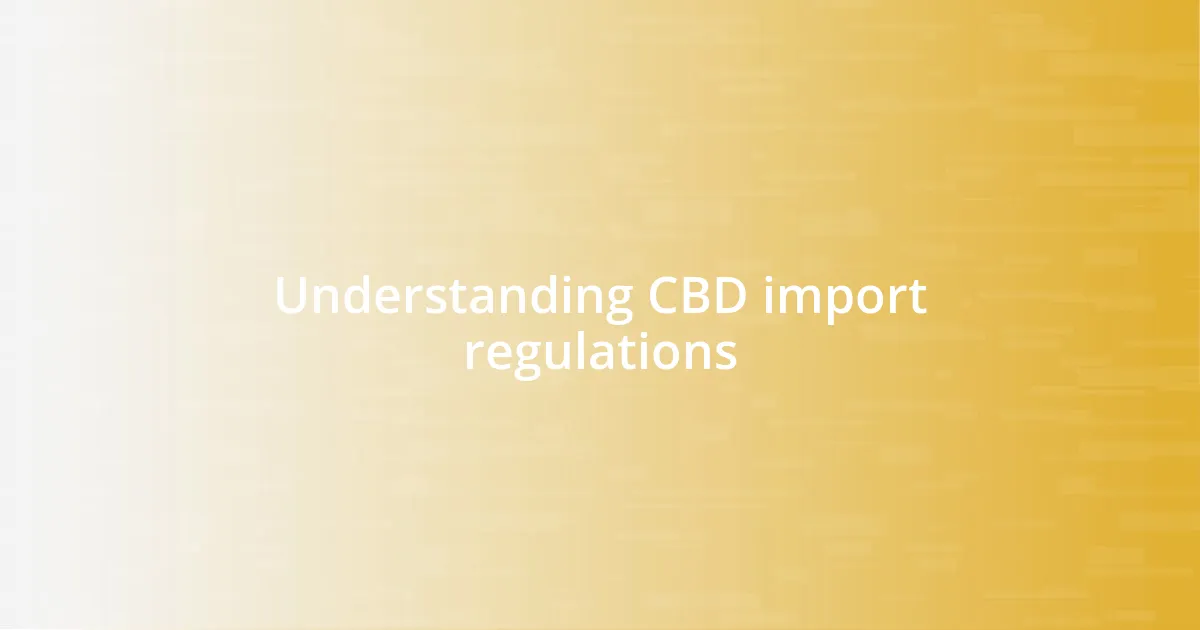
Understanding CBD import regulations
When diving into CBD import regulations, it’s essential to grasp the distinctions between various jurisdictions. I remember the first time I attempted to import CBD products; it felt like navigating a maze without a map. Each country has its own rules, which can change frequently, making it vital to stay updated—otherwise, you might find yourself caught in legal limbo.
One aspect that really stands out to me is the importance of sourcing and documentation. When I first started, I overlooked the significance of having clear proof of compliance with local laws. Customs officials can be very stringent; they want to see everything from lab results to certificates of authenticity. Have you ever experienced that moment of panic when you realize you might not have everything ready? I have, and it’s not a pleasant feeling.
As the CBD market continues to expand, I can’t help but wonder how regulations will evolve. Will we see more harmonization across borders, or will it remain a patchwork of rules? Personally, I remain hopeful for clarity that can open doors for responsible businesses while ensuring consumer safety. It’s a delicate balance, but understanding the regulations is the first step toward success in this burgeoning industry.
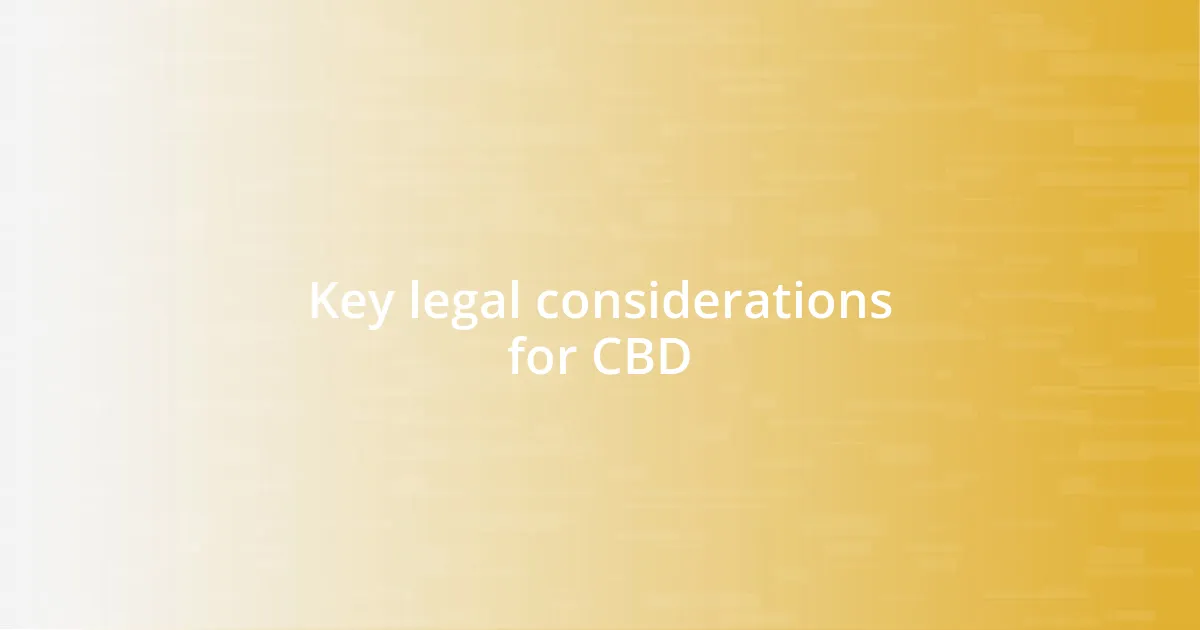
Key legal considerations for CBD
When considering the legal landscape of CBD, one must always be aware of the varying definitions of what constitutes legal CBD. I recall a conversation with a friend who went to Germany thinking he could bring CBD oil with him. Little did he know, the country has a strict limit on THC content, which tripped him up at customs. For many, distinguishing between full-spectrum, broad-spectrum, and isolate CBD is crucial to avoid unwanted legal trouble.
It’s also important to take note of additional regulations regarding labeling and marketing. I remember feeling overwhelmed when I first began studying how necessary it is for companies to provide accurate information on their products. Misleading claims can lead to hefty fines, and I’ve seen many newcomers face backlash simply because they didn’t understand the legal requirements for their claims. Often, these details can feel tedious, but they are incredibly important for the integrity of the industry.
Interestingly, I’ve found that keeping abreast of local laws can be a full-time job. When I started my journey in the CBD industry, I quickly learned that what was permissible in one state might land you in trouble in another. Seeking legal counsel has been invaluable; I’ve even made it a point to attend industry events where regulations are discussed. Have you ever felt lost in a shroud of rules? I know I’ve been there, but surrounding myself with knowledgeable people truly helps illuminate the path.
| Aspect | Key Legal Considerations |
|---|---|
| THC Content | Must comply with local limits; varies by country |
| Labeling | Accurate product information is essential to avoid penalties |
| Local Regulations | Always check state or country-specific laws |
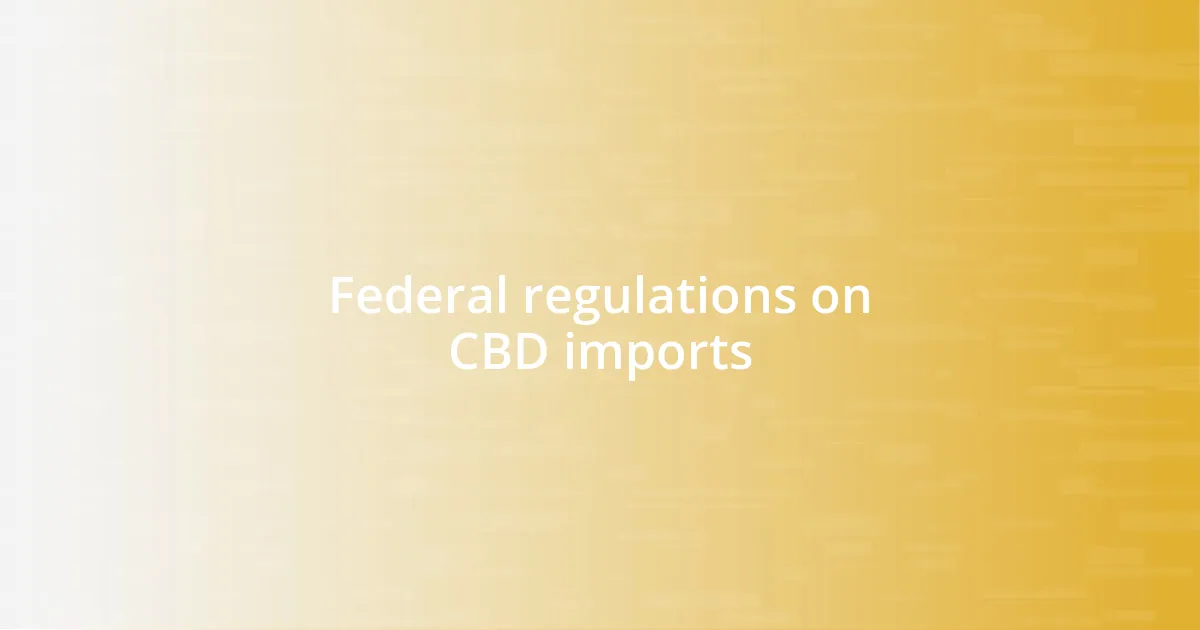
Federal regulations on CBD imports
The federal regulations on CBD imports are crucial for anyone considering entering this space. I once found myself in a heated debate about the legality of certain CBD products I wanted to import. It turns out that under the 2018 Farm Bill, which legalized hemp-derived CBD containing less than 0.3% THC, it’s essential for importers to provide evidence that their products meet these THC criteria. The tension during that conversation reminded me of how important it is to have your facts straight.
Here are some critical points to remember regarding federal regulations:
- Farm Bill Compliance: Ensure products contain less than 0.3% THC to qualify as hemp-derived.
- Import Documentation: Prepare necessary documents like phytosanitary certificates and THC lab results.
- FDA Oversight: Be aware that the FDA has specific guidelines related to health claims and product safety.
Navigating these regulations can feel overwhelming, especially when faced with the nuances of federal and state laws. I still recall the anxiety I felt while waiting for customs clearance, wondering if I had included every required document. It’s a balancing act, and attention to detail is vital. Understanding these regulations can save you from headaches down the road, and believe me, the peace of mind is worth it!
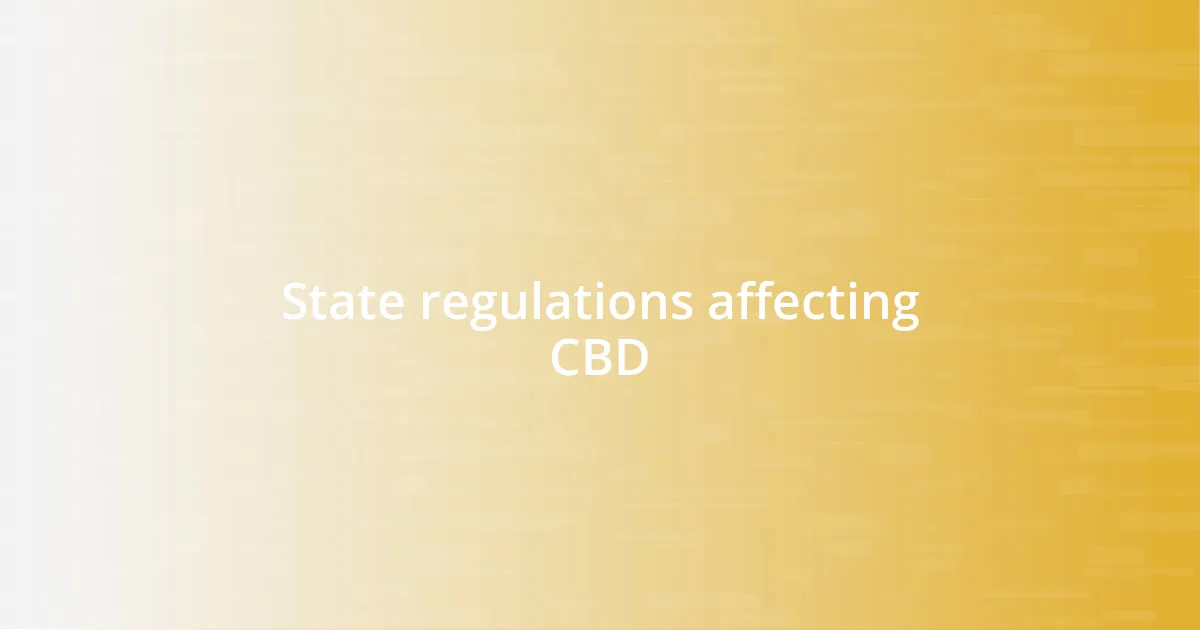
State regulations affecting CBD
Each state in the U.S. has its own set of rules regarding CBD, and I can tell you firsthand how that can lead to confusion. For instance, while living in California, I quickly learned that local regulations were surprisingly flexible, allowing various CBD products in both retail and online stores. But just a short drive to Nevada showed me a totally different landscape, where strict licensing requirements left many out of the market. It makes you wonder—how can businesses thrive when the playing field changes so drastically from one state to another?
When I first launched my CBD product line, I was hit with the reality of state regulations limiting the types of CBD products I could sell. In one state, edibles were perfectly acceptable, while in another, they faced heavy restrictions—or worse, outright bans. This stark difference made me realize how crucial it is to tailor your strategy based on local laws. Have you ever felt like you’re navigating a maze without a map? I certainly felt that frustration in those early days, spending hours researching each state’s rules.
Moreover, understanding state regulations isn’t just about compliance; it’s also about building trust with your customers. I remember attending a local farmers’ market and discussing my CBD products with potential buyers. They were genuinely curious about where I sourced my ingredients and how I ensured compliance with the law. This experience showed me that transparency not only protects your business but also fosters a loyal customer base. After all, who wants to buy something that could potentially land them in legal trouble?
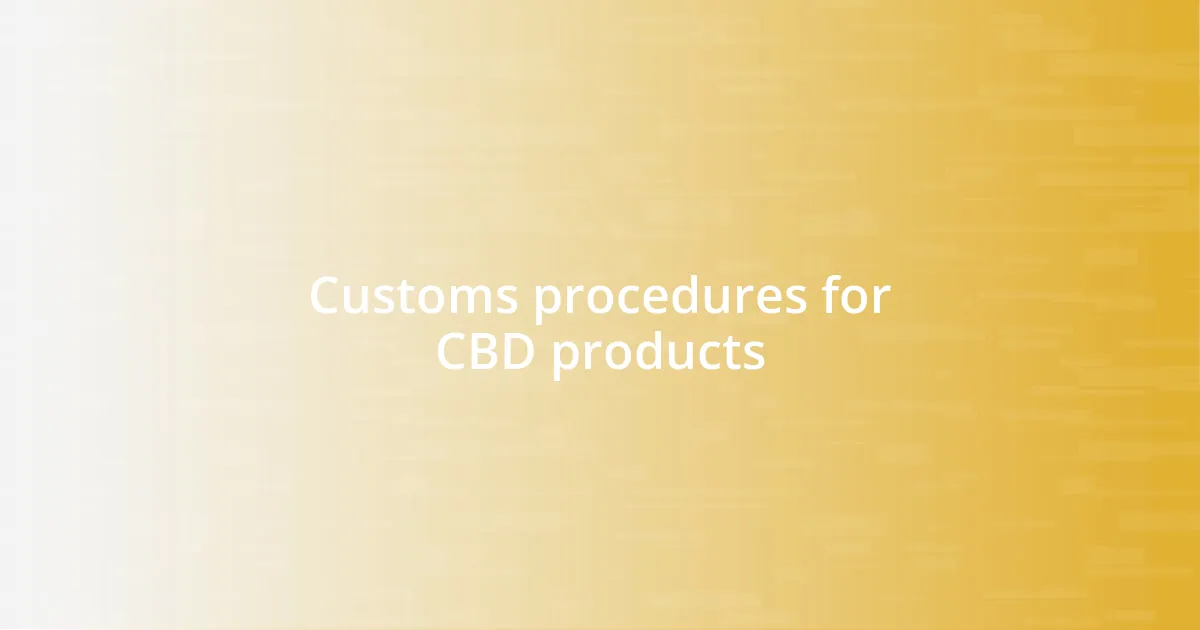
Customs procedures for CBD products
Customs procedures for importing CBD products require meticulous attention to detail. I remember the first time I stood at customs, my heart racing as I presented my documentation. It was a mix of excitement and anxiety, unsure if my carefully compiled paperwork would meet their stringent requirements. Despite the nerves, I realized that ensuring all documentation—like import permits and invoices—were in order was the key to a smooth process.
Interestingly, I quickly learned the importance of labeling during my import journey. One time, I had a shipment held up simply because the packaging wasn’t compliant with customs regulations. I felt that gut-wrenching dread as I wondered if my products would be released in time to meet a launch deadline. From that experience, I started double-checking each label for compliance, which made a huge difference in preventing delays.
Another aspect that caught me off guard was the customs duties that can apply to CBD imports. As I navigated these fees, I found myself pondering, are these costs manageable for new businesses? Initially, they felt overwhelming, but understanding how to calculate them helped me budget effectively. Now, I’m much more prepared, and I encourage others in this space to equip themselves with that knowledge early on—this way, surprises don’t derail your plans, allowing you to focus on what truly matters: your product and your customers.















